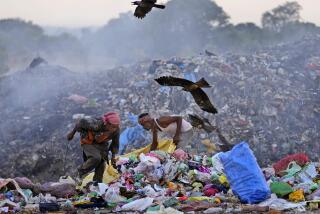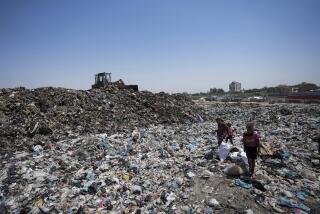Some Profit, Others Do the Dirty Work
BAGHDAD — Ayad Daoud doesn’t look to be a day older than 8 but, like most able-bodied children in the rubbish-strewn slum once called Saddam City, he now insists he’s 15 years old.
That’s because 15 is the minimum age for day laborers on the trash-collection crews bankrolled by the U.S.-led occupation authority and administered by the clannish networks of public servants who dole out scarce jobs, often in return for kickbacks.
The streets are cleaner after nearly two weeks of what the U.S. initiators claim is Baghdad’s first citywide sanitation service. The herculean effort to clean up a city that sullies itself anew within hours employs about 25,000 Iraqis.
But in the two-steps-forward, one-step-back rhythm of Iraq’s postwar reconstruction, the cleanup also has provided new opportunities for corruption and child labor.
Ayad’s reason for wanting a part in the gritty work that involves shoveling dust, rubble and garbage into a flatbed truck is that he, as much as a typical working-age Iraqi, needs the money. Officials here tend to agree.
“Some children under 15 have to work because they have no one else to provide for them. Maybe Saddam Hussein killed their parents and they have no one left,” said Emad Mubdir Jasim, head of the municipal office overseeing the hard-up part of town where Ayad and dozens of other children beg trash-collection contractors to hire them.
“Sometimes, for humanitarian reasons, you have to let them work,” he added. “Otherwise they might take a wrong way to getting money.”
As envisioned by Susan C. Tianen, the U.S. Army Corps of Engineers’ solid-waste management specialist who pulled the program together, private contractors who are paid $150 a month were to hire local workers for each route at a rate of $3 per day.
But neither Ayad nor the adults on the crews in Saddam City -- now called Sadr City, after a late, revered cleric -- were getting even 3,000 dinars a day, half the sum provided by the coalition.
“We’re forced to accept it because there is no other work,” complained Mohammed Qasim, who said he owned a clothing shop before the American-led war destroyed his business. “Everyone is out of work now, and the contractors tell us take it or leave it.”
Qasim drives a battered tractor along the streets of his contractor’s route to collect piles of trash assembled on medians and sidewalks by the young road crews, who sweep or shovel trash from apartment stoops, vacant lots and curbsides. He said he must pay for gas out of his already depleted wages.
The contractors also pocket half the money provided to rent trucks from citizens, said Hamid Hasim, another 15-year-old whose family provided its flatbed tractor for 25,000 dinars a day, not the budgeted 50,000.
Sadr City is the kind of rough neighborhood where outsiders seldom tread and even less often understand its inner workings. But the fawning staff members and unapproachable venues where city leaders are ensconced speak for themselves, with guards blocking entry to those thronging the gates to lodge complaints and public servants parceling out grunt jobs at a handsome profit.
From behind a massive desk, Sadr City “mayor” Rahim Daraji insisted that each person hired for the garbage detail is getting his $3 and that city employees are deployed to ensure that all are doing their jobs.
Tianen conceded that the Iraqi traditions of favoritism and kickbacks made U.S. organizers alert to potential corruption. Coalition forces in Baghdad have been tasked with reporting violations, she added, including the hiring of those under age.
Adel Sabbar, a 24-year-old with a degree in social science, said he doesn’t mind toiling amid refuse even though he is qualified for something better. The only other work available is guarding public buildings and embassies, which he fears in light of the recent terrorist bombings at the Jordanian Embassy and United Nations headquarters.
“I don’t want to become a martyr. This is safer,” he said of trash collection. “Besides, it’s our city and we want to serve it.”
That public-spiritedness is seldom shared by Baghdad residents still angered by daily power outages, food and fuel shortages and the foreign occupation of their country.
“Paul Bremer said he gave jobs to the Iraqis that pay $3, but it’s not $3!” fumed Adnan Mousa, referring to the American envoy who governs the Coalition Provisional Authority.
Mousa tried to complain to some U.S. troops but was waved away amid tightened security. “He should keep an eye on this, but he’s like any president. He just comes here and talks.”
Liwaa Abid Ali is pleased to be working after months with no income. But Ali, 26, expresses the bemusement with the new collection system that many Iraqis feel. Plastic bags used to be provided to households, which would tip freelance collectors the equivalent of a few cents to haul away their refuse.
Now, with neighbors tossing their waste out windows, the garbage piles up as soon as the workers are done sweeping.
The interim city managers argue that environmental issues are important to Iraqis and disposal behavior will change, especially after bags and containers are funded in next year’s budget.
“I don’t think it will take them that long to catch on,” Tianen said of the ubiquitous garbage and the cats, rats and insects that can carry disease from it to the human population. “I don’t think anyone wants to live like that.”
More to Read
Sign up for Essential California
The most important California stories and recommendations in your inbox every morning.
You may occasionally receive promotional content from the Los Angeles Times.











